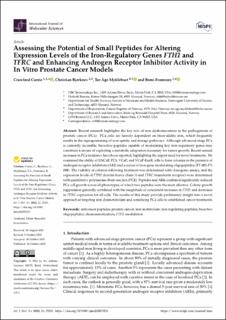Assessing the Potential of Small Peptides for Altering Expression Levels of the Iron-Regulatory Genes FTH1 and TFRC and Enhancing Androgen Receptor Inhibitor Activity in In Vitro Prostate Cancer Models
Peer reviewed, Journal article
Published version
Permanent lenke
https://hdl.handle.net/11250/3108025Utgivelsesdato
2023Metadata
Vis full innførselSamlinger
Originalversjon
10.3390/ijms242015231Sammendrag
Recent research highlights the key role of iron dyshomeostasis in the pathogenesis of prostate cancer (PCa). PCa cells are heavily dependent on bioavailable iron, which frequently results in the reprogramming of iron uptake and storage pathways. Although advanced-stage PCa is currently incurable, bioactive peptides capable of modulating key iron-regulatory genes may constitute a means of exploiting a metabolic adaptation necessary for tumor growth. Recent annual increases in PCa incidence have been reported, highlighting the urgent need for novel treatments. We examined the ability of LNCaP, PC3, VCaP, and VCaP-EnzR cells to form colonies in the presence of androgen receptor inhibitors (ARI) and a series of iron-gene modulating oligopeptides (FT-001-FT-008). The viability of colonies following treatment was determined with clonogenic assays, and the expression levels of FTH1 (ferritin heavy chain 1) and TFRC (transferrin receptor) were determined with quantitative polymerase chain reaction (PCR). Peptides and ARIs combined significantly reduced PCa cell growth across all phenotypes, of which two peptides were the most effective. Colony growth suppression generally correlated with the magnitude of concurrent increases in FTH1 and decreases in TFRC expression for all cells. The results of this study provide preliminary insight into a novel approach at targeting iron dysmetabolism and sensitizing PCa cells to established cancer treatments.

